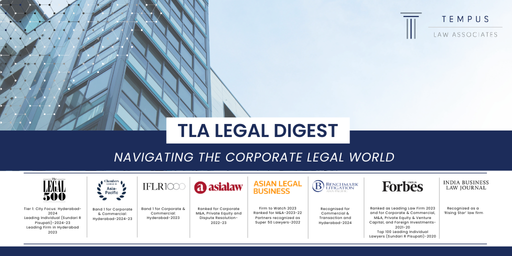Determination of nature of services between a subsidiary and its overseas parent company through recent case law

On October 8, 2021, the Customs, Excise and Services Tax Appellate Tribunal
(“CESTAT”), in the case of CHF Industries India Private Limited v. Commissioner of
Central Goods and Service Tax, has dealt with the issue of whether the services
provided by a wholly owned subsidiary company in India to its parent company in a
foreign country could be treated as ‘export of services’ and are exempt from payment
of service tax.
Facts: CHF Industries India Private Limited (“Subsidiary Company”) is a wholly
owned subsidiary of CHF International Limited, Hong Kong (“Parent Company”). The
Subsidiary Company provided the Parent Company with services in the nature of
‘assistance in procurement of goods from third parties in India by the Parent
Company. Such services include quality checks, keeping a track of consignment
etc. The Subsidiary Company raised an invoice for reimbursement of expenses for
such services, and the payment was received from Parent Company in convertible
foreign exchange. Since, in general, service tax is payable by a service provider within
30 days from the date of receipt of payment of a taxable service, the Subsidiary
Company paid service tax on such services presuming that such services were taxable.
Later, on realizing that such services fell under the ambit of ‘export of services’ and
are exempt from service tax, the Subsidiary Company filed an application for refund
of service tax paid. The Assistant Commissioner and the Ld. Commissioner rejected
the refund claims of the Subsidiary Company. The Subsidiary Company challenged
such orders before the CESTAT.
Issue: Whether the services provided by a wholly owned subsidiary company in India
to its parent company in a foreign country, could be treated as ‘export of services’ and
if yes, then whether the service tax paid under mistake of law by treating such ‘export
of services’ as taxable services, is refundable.
Applicable Laws: Rule 6A of the Service Tax Rules, 1994 which deals with ‘export of
services’ states that the provision of any service shall be treated as export of service
when:
a. the provider of service is located in the taxable territory;
b. the recipient of service is located outside India;
c. the service is not a service specified under section 66D of the Finance Act, 1994
d. the place of provision of service is outside India;
e. the payment of such service has been received by the provider of service in
convertible foreign exchange;
f. the provider of service and recipient of service are not merely establishments
of a distinct person in accordance with Section 65B(44) Explanation 3(b) of
Finance Act, 1994.
Tribunal’s Observations: On appeal, the CESTAT observed that there is no dispute in
the present case regarding satisfaction of conditions (a), (b), (c) and (e) as specified in
Rule 6A. In relation to the conditions specified in (d) and (f) of Rule 6A, CESTAT held
that:
1. The services provided by the Subsidiary Company are being provided on its own account, on principal-to-principal basis, to the Parent Company which is located outside India and hence the condition of the place of provision of service is satisfied in this case. Further, it cannot be said that the services provided by the Subsidiary Company to the Parent Company are ‘intermediary services’ since they are neither being provided in India as required for a service to be classified as ‘intermediary service’ under Rule 9 of Place of Provision of Services Rules, 2012 nor is it arranging or facilitating provision of service between the Parent Company and the third parties in India.
2. Although the Parent Company is a holding company of the Subsidiary Company, it does not mean that the Subsidiary Company and its Parent Company are the ‘same person’. The tribunal relied on the judgment of the Supreme Court in the case of Vodafone International Holdings v. Union of India (2012) 6 SCC 613 wherein it was held that “The approach of both the corporate and tax laws, particularly in the matter of corporate taxation, generally is founded on the abovementioned separate entity principle i.e. treat a company as a separate person…Companies and other entities are viewed as economic entities with legal independence vis-à-vis their shareholders/participants. It is fairly well accepted that a subsidiary and its parent are totally distinct taxpayers.” In lieu of such observations, CESTAT held that, since all the conditions of ‘export of services’ as provided in Rule 6A of Service Tax Rules,1994 are fulfilled, the services provided by the Subsidiary Company fall under the ambit of ‘export of services’ on which no service tax was payable, and the Subsidiary Company is entitled to refund of the service tax paid under mistake of law along with interest.
Conclusion: We concur with and welcome this decision of the CESTAT as it clarifies that a parent company and its wholly owned subsidiaries, irrespective of their economic dependence, are separate legal entities, for the purpose of Rule 6A of the Service Tax Rules. It is also now established that merely because a subsidiary company is providing services to its holding company, it cannot be assumed that it is providing intermediary services. The nature of services, place of providing services, nature of payment etc. are crucial in determining the applicable laws and taxes.
Related articles

TLA Legal Digest (March-April)
Our newsletter “𝐓𝐋𝐀 𝐋𝐄𝐆𝐀𝐋 𝐃𝐈𝐆𝐄𝐒𝐓 – 𝐍𝐚𝐯𝐢𝐠𝐚𝐭𝐢𝐧𝐠 𝐭𝐡𝐞 𝐂𝐨𝐫𝐩𝐨𝐫𝐚𝐭𝐞 𝐋𝐞𝐠𝐚𝐥 𝐖𝐨𝐫𝐥𝐝” for the month of 𝘔𝘢𝘳𝘤𝘩-𝘈𝘱𝘳𝘪𝘭 2024 designed to keep you informed about the latest legal updates and their implications. From corporate law and SEBI regulations to significant judicial pronouncements in real estate and employment law, this comprehensive overview ensures you’re up to date with critical changes in the legal landscape.

The Startup India Seed Fund Scheme
What is it?The Startup India Seed Fund Scheme (SISFS) is a sector agnostic INR 945 Crore startup fund, set up by the...

Spending of corporate social responsibility funds
Spending of CSR funds for COVID-19 is an eligible CSR activityThe Ministry of Corporate Affairs (“MCA”) issued a...

SEBI tightens Related Party Transactions (RPT) norms
The Securities and Exchange Board of India (SEBI) has recently notified the SEBI (Listing Obligations and Disclosure...

Increased FDI cap for foreign direct investment in the insurance sector
The Ministry of Finance vide its notification S.O. 3411(E) dated August 19, 2021 issued the Foreign Exchange...